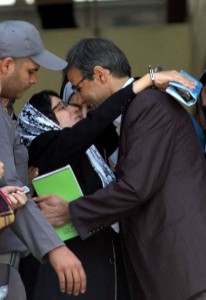Are Family Punishments a Coincidence? Nasrin Sotoudeh Explains Reason for Strike

In her letter, Nasrin Sotoudeh expresses hope that family punishments will be eliminated from the list of government policies of threats and pressure. The prominent human rights lawyer also thanks all the people, including human rights and civil activists, who have made her hopeful by expressing concern and support for her.
Nasrin Sotoudeh, the imprisoned Iranian human rights lawyer who just ended her 49-day hunger strike to protest the travel ban on her 12-year-old daughter, has written a letter addressed to the public and to human rights activists. In the letter that appeared on her husband Reza Khandan’s Facebook page today, Sotoudeh explains the reasons that led to her long-term hunger strike and expresses hope that family punishments will be eliminated from the list of government policies of threats and pressure.
Raising the question, “Why wasn’t I willing to end my strike?” Sotoudeh replies, “First they prosecuted my husband, then they started a new case for him. After my family and my children were detained, even though for just a few hours, again they created a new case for my 12-year-old daughter, and then in a hurried act, they punished her by banning her from traveling. My daughter, just like any other child and no more than other children, is entitled to live free of fear and threats of punishment. I have previously had the honor of defending many children of my land. Punishing children is strictly prohibited, let alone leveling political punishments [against them] for the sake of their parents.”
Sotoudeh points out in her letter that the family punishments were not merely directed toward her or her family. “Of the 36 women who are serving sentences in the political prisoners’ ward, the first-degree relatives of 13 of them are either in prison or are being prosecuted. This number comprises more than 1/3 of female political prisoners. There are also those who have more than one member of their family in prison or under prosecution. In protest to family punishments, which include my family’s punishment as [only] one example, I embarked on a hunger strike.”
In her letter, Nasrin Sotoudeh expresses hope that family punishments will be eliminated from the list of government policies of threats and pressure. The prominent human rights lawyer also thanks all the people, including human rights and civil activists, who have made her hopeful by expressing concern and support for her.
Nasrin Sotoudeh was arrested on September 21, 2010, and on January 8, 2011, she was sentenced to 11 years in prison, 20 years’ ban on her legal practice, and 20 years’ ban on foreign travel on charges of “acting against national security,” “collusion and propaganda against the Islamic Republic,” and “membership in the Defenders of Human Rights Center.” An appeals court subsequently reduced her sentence to six years in prison and ten years’ ban on her legal practice. She embarked on a wet hunger strike on October 17 to protest her conditions and the travel ban imposed on her daughter, Mehraveh, age 12.






